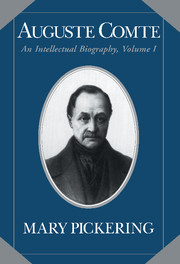Book contents
- Frontmatter
- Contents
- Acknowledgments
- Abbreviations
- Introduction
- 1 The Early Years
- 2 The Life and Works of Saint-Simon up to 1817
- 3 Comte's First Works for Saint-Simon
- 4 Comte's Growing Independence, 1819–1821
- 5 The Fundamental Opuscule and Comte's Rupture with Saint-Simon
- 6 The Aftermath of the Rupture: The Search for Connections
- 7 Comte's Efforts to Establish Himself
- 8 Intellectual and Mental Crises
- 9 The Road to Recovery, 1828–1830
- 10 Years of Success and Confrontation, 1830–1838
- 11 Comte's Changing Psyche and Aberrant Behavior, 1838–1840
- 12 The Encounter between Two Luminaries: Comte and Mill
- 13 1842: A Turning Point
- 14 Cours de philosophie positive: Positivism and the Natural Sciences
- 15 Cours de philosophie positive: Sociology
- Conclusion
- Bibliography
- Index
Conclusion
Published online by Cambridge University Press: 06 January 2010
- Frontmatter
- Contents
- Acknowledgments
- Abbreviations
- Introduction
- 1 The Early Years
- 2 The Life and Works of Saint-Simon up to 1817
- 3 Comte's First Works for Saint-Simon
- 4 Comte's Growing Independence, 1819–1821
- 5 The Fundamental Opuscule and Comte's Rupture with Saint-Simon
- 6 The Aftermath of the Rupture: The Search for Connections
- 7 Comte's Efforts to Establish Himself
- 8 Intellectual and Mental Crises
- 9 The Road to Recovery, 1828–1830
- 10 Years of Success and Confrontation, 1830–1838
- 11 Comte's Changing Psyche and Aberrant Behavior, 1838–1840
- 12 The Encounter between Two Luminaries: Comte and Mill
- 13 1842: A Turning Point
- 14 Cours de philosophie positive: Positivism and the Natural Sciences
- 15 Cours de philosophie positive: Sociology
- Conclusion
- Bibliography
- Index
Summary
In the 1860s, when Mill was contemplating his work on Comte, Gustave d'Eichthal asked him if he intended to include an exposition of the philosopher's life. Without hesitation, Mill replied, “In this work, a biography of Comte will count for very little, even more so since those who dispute around his tomb are in such disagreement as to the facts that I despair of arriving at the truth.” This book has attempted to accept the challenging task of tracing what Comte significantly termed his “original evolution.” It has focused on his demanding family, his regimented education, his volatile relations with friends and important figures of the period, his intense rivalry with the Saint-Simonians, his struggle against insanity, his enigmatic marriage, and the vicissitudes of his career. It has tied this personal story to the development of his thought and set both within the historical context. Comte's intellectual evolution is examined within the framework of the French Revolution and its aftermath, when the French were debating the advantages and disadvantages of both liberalism and nascent industrial capitalism.
Although the story of the last fifteen years of Comte's life remains to be told, I have maintained that there was no sudden break in his life in 1842.
- Type
- Chapter
- Information
- Auguste ComteAn Intellectual Biography, pp. 691 - 710Publisher: Cambridge University PressPrint publication year: 1993



